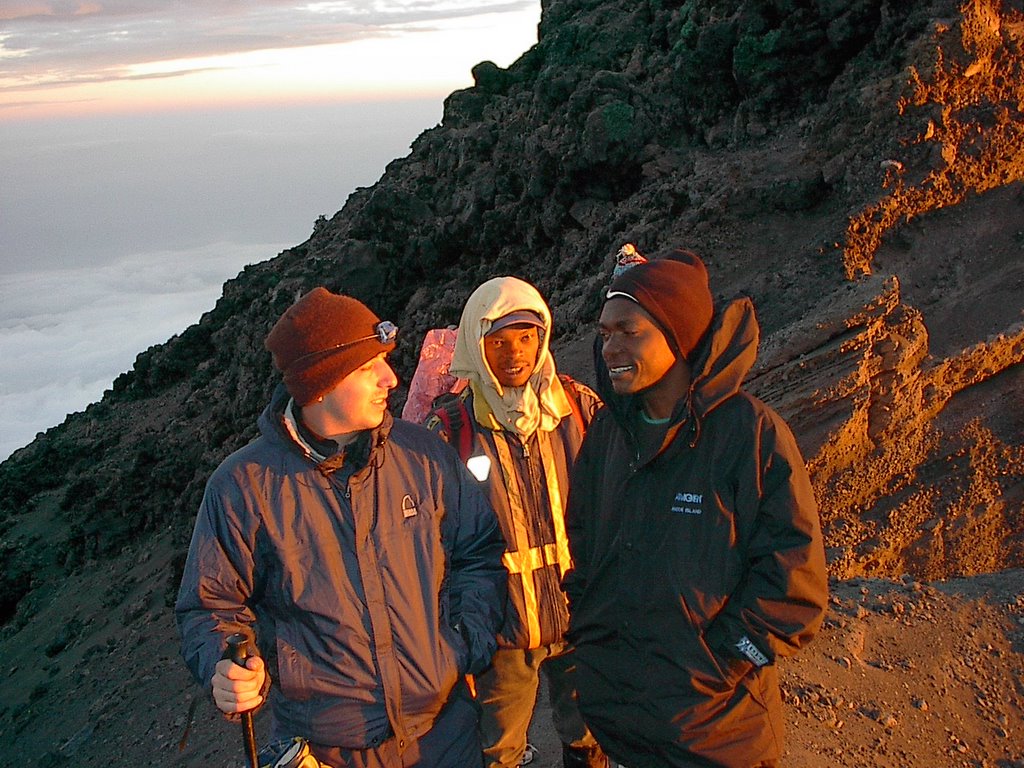Monday, April 09, 2007
Casting the Camouflage
During my visit to Kyela, Southern Tanzania, in September 2006 I was asked to meet HIV+ people who wanted to stop hiding in the shadows and form a peer support and AIDS advocacy group. Just three months later I returned to discover that these same HIV positive people have cast off their camouflage and made good on their word. They have opened an office in Kyela town and already have around 300 members.
These brave souls have called their organization Tumaini Waviu Network, “Hope Network” This may seem like a simple feat, but trust me it is not when one considers the overwhelming stigmatization AIDS sufferers face in their communities. Admitting you have AIDS can result in absolute social exclusion.
I met the founder and chairperson of Tumaini Waviu Network and he immediately handed me his government issued “blue card” that identifies him as HIV+. He introduced himself, “Karibu, my name is Mwapetanya and I have AIDS…here is my blue card.” I read through the card that lists his CD (white blood cells) count. 6 months ago it was 149. After 6 months of taking Anti-Retro Viral (ARVs) medication, his count is 6 times that.
A few minutes later a woman named Suma came into the office. She pulls down the thick file from the shelf, sifts through it and then hands me a photo copy of her “blue card.” She tells me that she is Mama Happy and Diana, two girls who stay in Ngonga village with their grandmother, the same grandmother who has provided me with food and shelter for the past year. Having known the girls for some time it suddenly becomes clear why they were so vague when I asked where there mother was. Their mother has AIDS and they did not want to tell me.
A small group of us talked for some time in that little room they called an office. I learned how the District Health Officer has visited and how doctors occasionally stop by to check up on patients. The ask me to help them find ways to find photocopy money and to pay the 20 dollars a month to pay for the office rental. I suggest looking to their community for support, but also promise to do what I can to help. I left Tumaini Waviu Network with a great sense of joy…something that we must hold on to when facing the AIDS pandemic. I had just met the people who are going to turn around the battle against the pandemic in Kyela.
I return to Ngonga Village and stopped by Godfrey’s house, Friends of Tanzania’s Project Supervisor in Kyela. Earlier he had informed me that some HIV positive people from the village wanted to meet with me and I wanted to see if he had arranged a time. Godfrey informed me that the person in question in fact lives just 20 metres away. The man presented himself as Griffin Fwombe. In fact, I had met this man several times, but had never been formally introduced. He told me how some HIV positive people wanted to use a classroom in the school for an AIDS support group. He showed me a list of names and some of them I recognized. I got a deep feeling of these people were just waiting for the opportunity to come out of the woodwork.
I gave Griffin permission to use a classroom, but would have to write a formal letter asking permission to do so. One of our teachers assisted him with that task and by that evening the letter scribbled on a crumpled piece of paper was in my hands.
These brief encounters are important because the give us a glimpse into the realities plaguing the fight against HIV/AIDS pandemic. Pandemic there is, there is doubt about that. Millions of people are infected with HIV and millions have died or are in the process of dieing from AIDS. It is time to unmask the root problems and face up to their challenges. The first problem is that many people, especially in rural areas, are afraid of the social and economic consequences of revealing their HIV+ status. Having an invisible population prevents us from effective intervention. We must create the environment in which people can safe to inquire about their HIV status and get treatment. Secondly, Politicians refuse to get their hands dirty and truly get involved. Sure they pay lip service, but they need to show support on the ground, at the grass-roots level. Thirdly, academics, donors and their armies of researchers, analysts and program supervisors must pull their heads out of the sand and start from the lowest common denominator – the HIV infected person – and work their way up. They must identify obstacles to HIV/AIDS education, testing, ARV distribution, health care, and most importantly, aid effectiveness and then set tangible objectives to remove or minimize those obstacles.
This past year the President of Tanzania, Jakaya Kikwete ordered his Ministers and other Public Servants to “end their love affairs with their chairs and get out of their offices and out amongst the people.” We should all listen to Kikwete’s words; the people are out their waiting for and needing our support.
a thousand words - Tanzania in Pictures
 Mwalimu "teacher" Hilda running with some of our 120 children in Ngonga Village, Kyela District, Tanzania.
Mwalimu "teacher" Hilda running with some of our 120 children in Ngonga Village, Kyela District, Tanzania. My sister Jesica with the kindergarden children in Kyela...they came to watch her paint a mural entitled "watoto wetu", "our children", which the school is named.
My sister Jesica with the kindergarden children in Kyela...they came to watch her paint a mural entitled "watoto wetu", "our children", which the school is named.
 Me and my girlfriend Jwani. The most wonderful person I have ever met...creative, dynamic and loving.
Me and my girlfriend Jwani. The most wonderful person I have ever met...creative, dynamic and loving.
